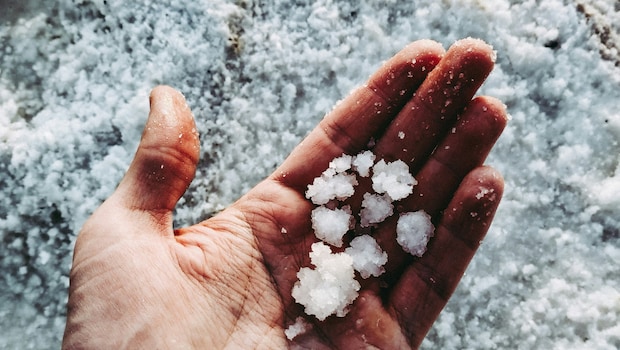You finish a plate of chaat, a packet of chips, or maybe some Chinese noodles, and suddenly, you feel unusually thirsty. You reach for a glass of water, and sometimes even that does not feel enough. Quite a familiar feeling, is it not? But have you ever wondered why salty food makes us feel this way? The answer lies in how our body tries to maintain balance. Salt, or sodium chloride, plays an important role in several bodily functions. And when we consume more salt than we need, the body responds by asking for more water. But that is not all.
Some recent studies suggest that the story might be a bit more complex than expected. Let us break it down.
Also Read: 8 Genius Tricks to Reduce Excess Salt in Curries
What Does Salt Do To The Body?
Our body needs salt to function, but in small amounts. Salt, or sodium, helps with muscle function, nerve signals, and fluid balance. The World Health Organisation (WHO) recommends less than five grams of salt intake a day, which is about one teaspoon.
It is believed that having salty food increases sodium levels in the blood, which pulls water from our cells and makes us feel thirsty. But a study published in The Journal of Clinical Investigation found that when salt levels go up, the body produces more urea, a compound that helps hold on to water while getting rid of salt. Making urea takes energy, which might explain why salty meals sometimes leave you feeling hungrier too.
A long-term study, conducted by researchers from Helmholtz, the German Aerospace Centre, looked at how salt affected fluid intake during a simulated Mars mission. Surprisingly, participants on a high-salt diet did not drink more water. In fact, they drank slightly less.
Instead of triggering thirst, the body adapted by producing more water internally. This process involved the liver, muscles, and kidneys working together to manage hydration. Here too, the researchers found that urea played a key role in the body's water retention, while excreting excess salt.
This means, while salty food may make you feel thirsty in the short term, your body might be doing more behind the scenes than we realise.
Also Read: Are You Trying To Cut Back On Salt? FSSAI Has The Perfect Tips For You

Photo Credit: Pexels
How Does The Brain React To Excess Salt?
The hypothalamus, a part of the brain, monitors hydration. When it detects high sodium levels, it sends out a thirst signal. That is why you suddenly feel like you need a drink, as explained by experts at the Cleveland Clinic.
Is Salt The Only Thing That Makes You Thirsty?
Salt is a common trigger, but other foods and lifestyle factors can also leave you reaching for water:
1. Sugary foods:
Sugar pulls water from your cells during digestion, which can leave you feeling dry.
2. Caffeine and alcohol:
Both are diuretics, meaning they make you urinate more and lose fluids.
3. Processed foods:
Packaged items like breads, biscuits, and sauces often contain hidden sodium, even though the food might not taste salty.
4. Hot weather or exercise:
Excess sweating leads to fluid loss and increased thirst.
5. Health conditions:
Lifestyle conditions like diabetes and certain medications can affect hydration levels as well.
Also Read: Are You Sprinkling Excess Salt Over Your Food? Stop Now!
Here Are 5 Easy Ways To Stay Hydrated
1. Drink water regularly:
Do not reach out for a glass of water just when you feel thirsty. Instead, sip it throughout the day to stay balanced.
2. Pair salty meals with water-rich foods:
Cucumber, watermelon, oranges, and tomatoes have high water content that helps maintain the fluid level in the body, making you feel less thirsty
3. Limit packaged snacks:
Almost every packaged snack contains more sodium than you realise, even if it does not taste that salty.
4. Cook with less salt:
Limit salt use in your daily meals and rely more on natural flavours, herbs, and spices to spruce up your meal.
5. Skip sugary or caffeinated drinks:
These are diuretic in nature and can be harmful, especially when you are already thirsty. In fact, these drinks can worsen dehydration in your body.
Eat healthy, stay fit!
Disclaimer: This content including advice provides generic information only. It is in no way a substitute for qualified medical opinion. Always consult a specialist or your doctor for more information. NDTV does not claim responsibility for this information.
About Somdatta SahaExplorer- this is what Somdatta likes to call herself. Be it in terms of food, people or places, all she craves for is to know the unknown. A simple aglio olio pasta or daal-chawal and a good movie can make her day.



